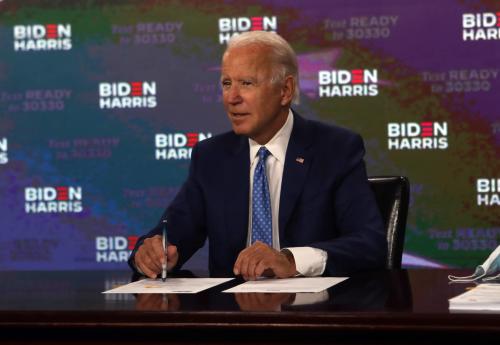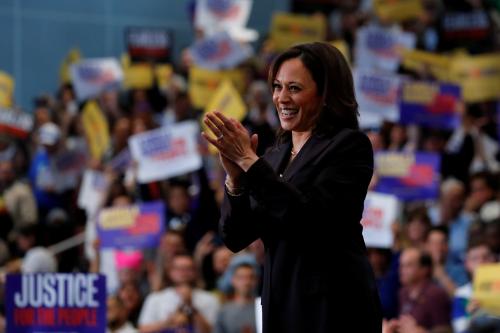When Joe Biden accepted the nomination of the Democratic Party on Thursday night, it brought to a close a convention that was remarkable not only for the fact that it was virtual but also for the fact that it set up a presidential race about “the content of our character.” This phrase was made famous by Dr. Martin Luther King speaking, more than half a century ago, of his desire to have his children grow up in a country where they would “not be judged by the color of their skin but by the content of their character.” But never before has it seemed so appropriate to a presidential election.
Throughout the week, given the choice between policy and character, Democrats focused on character and the contrast between Joe Biden as a person and Donald Trump as a person. Biden himself drew the contrast. In his acceptance speech he said, “Character is on the ballot. Compassion is on the ballot. Decency is on the ballot.”
Just like everything else these days, this convention makes a clear break from the past. Other conventions have sought to highlight the policy differences between the two parties and warn citizens of the dire consequences of electing the other party’s candidate. For instance, had Donald Trump been a normal Republican president, we would have heard a great deal more about the Republican tax bill, Trump’s single largest domestic accomplishment. But even though it is a huge contributor to the income inequality that most Democrats have railed against for many years, the tax bill was barely mentioned. Other issues like health care and climate change were given their place on the agenda but the big guns at this convention were trained not on Trump’s policies, but on his person and his presidency.
That hasn’t always been the case. Previous conventions tended to focus on policy more than on character. For instance, in 2000 vice presidential candidate Joe Lieberman said “Our opponents are decent and likeable men… I wish they would also change their policies.” Years later President Obama said, “Let there be no doubt. The Republican nominee, John McCain, has worn the uniform of our country with bravery and distinction, and for that we owe him our gratitude and respect.” And at the 2012 convention the keynoter, Senator Mark Warner, (D- Va.) said of the Republican nominee Mitt Romney “I don’t think Governor Romney meant any harm. I think he’s a good guy,” before going on to criticize Romney’s economic policies.
No one at the 2020 Democratic convention thought President Trump was decent, worthy of our gratitude and respect or a good guy simply with misguided policies. Instead the vice presidential nominee Kamala Harris characterized his presidency as “constant chaos … incompetence and callousness.” Senator Elizabeth Warren talked about Trump’s “ignorance and incompetence.” Hillary Clinton wished that “Donald Trump knew how to be a president because America needs a president.” And former President Bill Clinton said, “If you want a president who spends hours a day watching TV and insulting people on social media, he’s your man.” He went on to say that Trump would continue to “blame, bully and belittle” if he spent four more years in office.
But the biggest attacks on Trump’s character came from President and Mrs. Obama. In a break from tradition, the former president outlined a striking indictment of the current president’s character. “I never expected my successor would embrace my policies,” said Obama, “But I did hope Donald Trump would take the job seriously. He has shown no interest in putting in the work. Donald Trump hasn’t grown into the job because he can’t.” And earlier in the week the former first lady said, “Donald Trump is clearly in over his head…He lacks the ability to walk in someone else’s shoes.”
The attacks on Trump revolved around character and competence, as did the tributes to Joe Biden. Every modern convention features some average voters—in video or in person—to praise their candidate. Often, however, they were drawn from a rope line, worked at a rally, or were sought out and invited to an event on the campaign trail. Joe Biden’s average voters actually know him. Most touching were the tributes from the Amtrak staff that had gotten to know him during all those years he commuted home from Washington to Wilmington, Delaware. And one of the most unusual nominating speeches was made by Jacquelyn Brittany, a security guard at the New York Times building who briefly but sincerely got to know Mr. Biden on a short ride up to the newsroom.
When talking about Biden, his supporters didn’t dwell on his long years of experience in government; instead, they talked about his work ethic and his character. On the third night of the convention, we heard from a grandmother who said “He’ll care about you more than he’ll care about himself.” Jill Biden recounted the story of their family and said, “I know if you entrust this nation to Joe he will do for our nation what he did for our family.” And Michelle Obama said, “I know Joe, he listens. He will tell the truth. He will govern as someone who has lived the life the rest of us can recognize.”
Republicans will argue that the Democrats did not lay out a vision for the future. And some on the left wing of the Democratic Party will complain that Biden didn’t resolve issues to their liking. But for most Democrats (and perhaps some independents and Republicans), debates about the proper level of taxes or about the virtues of Medicare-for-all versus a public option shrink compared to the threat that Trump poses to the presidency and to democracy. There will be time for the Democrats to sort out their next steps on health care and time for Democrats and Republicans to re-engage in their decades-long arguments about how to manage the economy. In the meantime, however, this election transcends policy and asks us to judge these men by the content of their character.







Commentary
Joe Biden’s convention was about the content of our character
August 21, 2020